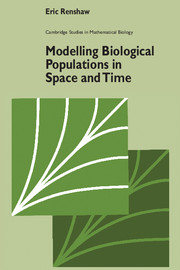Book contents
- Frontmatter
- Contents
- Dedication
- Preface
- A list of symbols and notation
- 1 Introductory remarks
- 2 Simple birth–death processes
- 3 General birth–death processes
- 4 Time-lag models of population growth
- 5 Competition processes
- 6 Predator–prey processes
- 7 Spatial predator–prey systems
- 8 Fluctuating environments
- 9 Spatial population dynamics
- 10 Epidemic processes
- 11 Linear and branching architectures
- References
- Author index
- Subject index
Preface
Published online by Cambridge University Press: 05 August 2012
- Frontmatter
- Contents
- Dedication
- Preface
- A list of symbols and notation
- 1 Introductory remarks
- 2 Simple birth–death processes
- 3 General birth–death processes
- 4 Time-lag models of population growth
- 5 Competition processes
- 6 Predator–prey processes
- 7 Spatial predator–prey systems
- 8 Fluctuating environments
- 9 Spatial population dynamics
- 10 Epidemic processes
- 11 Linear and branching architectures
- References
- Author index
- Subject index
Summary
The remarkable variety of dynamic behaviour exhibited by many species of plants, insects and animals has stimulated great interest in the development of both biological experiments and mathematical models. From a relatively slow start in the 1920s and 1930s, the pace of research has quickened dramatically over the past few years. Unfortunately, however, ideas have polarized at the same rate. Theoreticians often model purely in terms of manipulating mathematical equations, throwing in the occasional biological reference merely to gain practical respectability; whilst biologists may develop vaguely plausible deterministic models which reflect mathematical hope rather than biological reality.
Many researchers still use one approach to the total exclusion of the other. The reasons are two-fold. First, pioneering biological studies were greatly influenced by deterministic mathematics, and reluctance to accept stochastic ideas is still ingrained. Second, too many mathematicians are taught in a practical vacuum, with the result that instead of using mathematics to interpret and understand biological phenomena they become transfixed by the models themselves.
In this book we develop a unifying approach. First, we show that both deterministic and stochastic models have important roles to play and should therefore be considered together; popular deterministic ideas of logistic, chaotic and predator–prey relationships can change markedly when viewed in a stochastic light.
Second, in biology we are often asked to infer the nature of population development from a single data set, yet different realizations of the same process can vary enormously.
Information
- Type
- Chapter
- Information
- Modelling Biological Populations in Space and Time , pp. xiii - xivPublisher: Cambridge University PressPrint publication year: 1991
